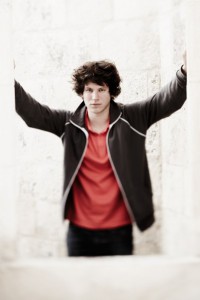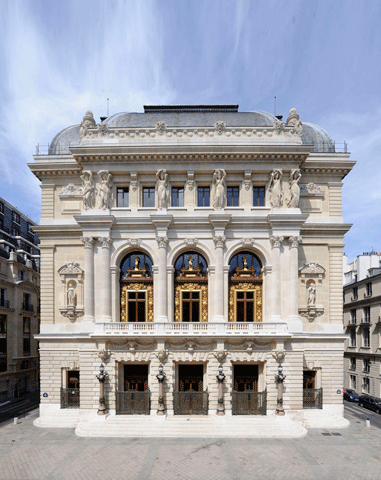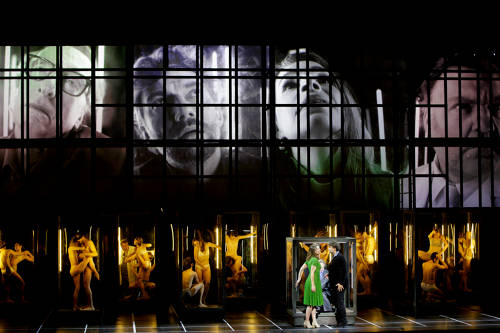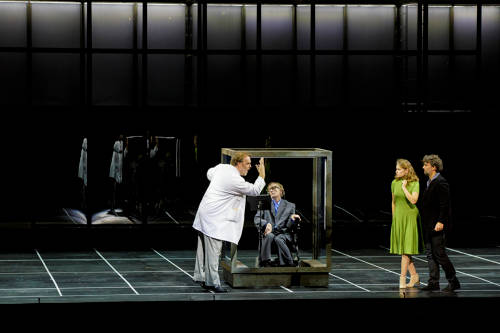By: Frank Cadenhead
Where is Stephen Colbert when you need him? He certainly could do a comedy routine about the train wreck that is the opening of the musical season in Paris this year. The goofiness of multiple openings of world-class events on the same day would get lots of laughs. In his absence I will try to fill in.
The French go on holiday in August. On September 1 they all arrive home and start unpacking and restocking their refrigerators. For those who work in opera or orchestras, after some days they are off to rehearsals to prepare for opening night. This year, “opening night” is all on one night, September 16. That night is the remarkable opening of internationally important season at the Opéra National de Paris. Their daring risk is to open with an almost unknown opera, Eliogabalo of Francesco Cavalli (composed in 1667). This effort is part of a recent laudable effort to revive interest in lesser known opera composers and return their works to the stage. The audience at the Palais Garnier will hear a much anticipated local debut of Leonardo Garcia Alarcon in the pit with Franco Fagioli in the title role. Young Thomas Jolly will stage this work and it is expected to raise the artistic bar for the whole season (which will include productions staged by Calixto Bieito and Dmitri Tcherniakov.)
But wait! On that very same night, the Orchestre de Paris is having a flashy opening in their glamorous new home at the Philharmonie de Paris with their exciting new music director, Daniel Harding. The opening program is the entirety of Scenes from Goethe’s Faust by Schumann. This spotlight makes a statement about the work, a magnificent and little-played masterpiece with soloists and chorus and will feature the masterful baritone Christian Gerhaher as Faust. Harding has been particularly engaged by this opus and has featured it in broadcasts when he appeared with the Berlin Philharmonic and has recorded it with the Bavarian Radio Symphony Orchestra and Chorus. How could this singularly important event be scheduled on the same night as the opening Eliogabalo?
Easy… A complete lack of management. Here is Norman Lebrecht’s writing about the Orchestre de Paris on his website Slipped Disc on September 12:
“There was widespread discontent when the Orchestre de Paris sacked Didier de Cottignies ahead of the arrival of its new music director, Daniel Harding.
No-one in the music world has a bigger contacts book than Didier and few know more about music.
However, Didier went and Daniel was said to be considering an English mate for the job. Apparently, that was greeted by the French like a Brexit-burger with HP sauce.
So the French establishment chose one of its own.
The new Délégué Artistique at the OdP is Edouard Fouré Caul-Futy, a producer at France-Musique. His experience is entirely with baroque music. He has a lot to learn.
He also happens to be the son-in-law of Martine Aubry, former presidential candidate and still a power-broker in the Socialist Party.
Aubry’s daughter, Clémentine, is Administrator of the auditorium at the Musée du Louvre.”

Edouard Foure Caul-Futy
Googling the name Edouard Foure Caul-Futy today, September 13, made it absolutely clear that there is no current information in the French language about any such appointment on any French site. Are all the culture reporters still unpacking? Scrolling down his personal Facebook page, we see that he is just 35 and entered a note that he has left Radio France at the end of August. “Délégué Artistique, Orchestre de Paris,” is now shown as his current title. The Facebook page of the Orchestre de Paris shows nothing. Neither does their website and the only press contact listed on that site is for the excellent Annick Boccon-Gibod, who let us all know, on June 27, that she had left the orchestra. The speculation of Mr. Lebrecht, that this was an insider favor, seems more and more believable when the slim career of the new artistic director is more visible. It would be hard to image a serious job search resulting in the selection of someone with such a light CV, concentrated almost entirely in the early music scene.
But wait again! That same evening’s vital openings are not finished. September 16 has yet another important opening night, that of the Orchestre Philharmonique de Radio France in the auditorium at Radio France. Conductor Mikko Franck, starting his second year as music director, has recharged this orchestra and every concert shows the new excitement. This opening night has Einojuhani Rautavaara’s Lapsimessu (Children’s Mass). Rautavaara died just seven weeks ago and Franck, a fellow countryman of the composer, will conduct this work with the Maîtrise de Radio France, the children’s chorus. The Bruch Violin Concerto No. 1 is to be played by France’s most renowned violin virtuoso, Renaud Capuçon, and Franck, a well-appreciated interpreter of Richard Strauss, will finish with the Alpine Symphony. It would be hard to imagine a music lover willing to pass on that concert.
There is good news. With the new halls, the Philharmonie and the Radio France Auditorium, both with outstanding acoustics, the possibility of scheduling all opening nights on the same day is easier. Also, when you look at seat availability for all those events on the 16th, you will see that all will be full. The Parisian audience is ever-expanding and it is clear that the new halls, particularly the Philharmonie, have attracted new ticket buyers.
But the bad news is the failure of management to understand the need for more public notice about what the classical music community offers the public. Since newspapers everywhere have been giving more space and notice to more popular music-making, classical music has seen a sag in their amount of space in the media. While Parisian concert reviews are still a feature in major publications and newspapers, the fact that editors and journalists have to choose events to cover and exclude others would be totally unnecessary if there was a reasonable consideration, by managers, of how to space your major events to achieve the maximum notice.
Here is my concert and opera schedule for the next few days. Thursday is the opening concert of the new season for the Orchestre National de France. With Daniele Gatti taking over the Concertgebouw Orchestra of Amsterdam this season, we are awaiting performances by the new Music Director, Emmanuel Krivine. Since any decision takes a great deal of time bouncing around the long halls of Radio France, his appointment was only announced in June, long after the schedule was fixed. Opening night will be conducted by the French conductor Stéphane Denève (who some imagine might have been a better choice than Maestro Krivine.) The all-French program features Ibert, Saint-Saëns, Ravel and Florent Schmitt’s La Tragédie de Salomé. The next night, the famous “train-wreck” Friday, I will be again at the Radio France Auditorium for the opening concert of the Orchestre Philharmonique de Radio France, already noted. I was forced to make that choice because this concert, unlike the other events on the same night, will not be repeated. Saturday night was free and I will see the revival of Tosca as the first opera at Bastille (with Anja Harteros, Marcelo Alvarez and Bryn Terfel) because after the previous night’s multiple openings, nothing was repeated the next night. It is Sunday afternoon for the Harding debut with the Orchestre de Paris. The Monday night ticket is for the second performance of Eliogabalo at Palais Garnier. I might write again after the experience is over but the concentration of delights is even now a bit numbing. Music critics cannot write about every event and editors will not consider making space for such a concentration of events. In almost any other city, managers would work together to fashion a two to four week opening so that all events get the attention they deserve. This idea has yet to occur to the musical establishment in Paris.
 Best Laid Plans Department: for the Opéra-Comique, closed for two years, the post-restoration opening remains a story to be continued. Nine performances of Offenbach’s Fantasio in February, with a starry cast, was originally the celebratory opening event of the newly refurbished hall, the iconic Salle Favart. Delays in the promised completion date pushed the Offenbach over to the Châtelet Theater, which had the dates free just before they are undergoing the restoration knife for more than two years.
Best Laid Plans Department: for the Opéra-Comique, closed for two years, the post-restoration opening remains a story to be continued. Nine performances of Offenbach’s Fantasio in February, with a starry cast, was originally the celebratory opening event of the newly refurbished hall, the iconic Salle Favart. Delays in the promised completion date pushed the Offenbach over to the Châtelet Theater, which had the dates free just before they are undergoing the restoration knife for more than two years.



